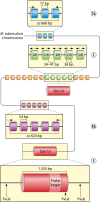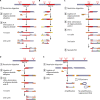Methodological and Clinical Aspects of the Molecular Epidemiology of Mycobacterium tuberculosis and Other Mycobacteria
- PMID: 26912567
- PMCID: PMC4786889
- DOI: 10.1128/CMR.00055-15
Methodological and Clinical Aspects of the Molecular Epidemiology of Mycobacterium tuberculosis and Other Mycobacteria
Abstract
Molecular typing has revolutionized epidemiological studies of infectious diseases, including those of a mycobacterial etiology. With the advent of fingerprinting techniques, many traditional concepts regarding transmission, infectivity, or pathogenicity of mycobacterial bacilli have been revisited, and their conventional interpretations have been challenged. Since the mid-1990s, when the first typing methods were introduced, a plethora of other modalities have been proposed. So-called molecular epidemiology has become an essential subdiscipline of modern mycobacteriology. It serves as a resource for understanding the key issues in the epidemiology of tuberculosis and other mycobacterial diseases. Among these issues are disclosing sources of infection, quantifying recent transmission, identifying transmission links, discerning reinfection from relapse, tracking the geographic distribution and clonal expansion of specific strains, and exploring the genetic mechanisms underlying specific phenotypic traits, including virulence, organ tropism, transmissibility, or drug resistance. Since genotyping continues to unravel the biology of mycobacteria, it offers enormous promise in the fight against and prevention of the diseases caused by these pathogens. In this review, molecular typing methods for Mycobacterium tuberculosis and nontuberculous mycobacteria elaborated over the last 2 decades are summarized. The relevance of these methods to the epidemiological investigation, diagnosis, evolution, and control of mycobacterial diseases is discussed.
Copyright © 2016, American Society for Microbiology. All Rights Reserved.
Figures










References
-
- Hayman J. 1984. Mycobacterium ulcerans: an infection from Jurassic time? Lancet ii:1015–1016. - PubMed
Publication types
MeSH terms
LinkOut - more resources
Full Text Sources
Other Literature Sources
Medical

